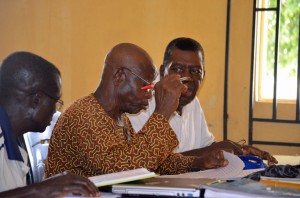Bible Translation
Bible Translation for Understanding & Accuracy
Words don’t hold the same meanings across cultures. Bible translators have to work carefully to ensure that the meaning of the words used communicate the same meaning as those used in the original Greek or Hebrew texts. Check out this video to find out how this relates to John 3:16 and the word love.
This video was originally posted on Wycliffe’s blog.
Explore Wycliffe
If you live in the Philadelphia area, then this event might interest you.
You can find out more information by clicking HERE.
A Heart for Bible Translation
“I can only ask that God give him the same as he’s given me.
How can I ask for any less than what God’s given me for every other man?
I’m no better than they.” ~George Cowan
George Cowan, an important leader in Wycliffe Bible Translators and SIL International, would have turned 101 today, February 15, 2017.
He passed away on February 11, 2017. We celebrate his life and service to the King of kings!
“George joined Wycliffe and SIL in the fall of 1942. He spent many years living and working in Mexico, where he met his wife, Florence. George’s many invaluable contributions to Bible translation in Mexico include publishing a description of the now famous whistle speech of the Mazatec people, serving as director of SIL Mexico and helping complete the Mazatec New Testament translation.” (This paragraph was copied from a Wylciffe email I received.)
Back in the summer of 2011, when I had my Equip training in Wycliffe’s Orlando office, George Cowan came and spoke to us. He shared some of the whistle speech referenced above as well.
The video included above shares his heart for Bible translation growing out of his love for people. That heart is why I serve with Wycliffe Bible Translators. I want to support the work of getting God’s Word to people who haven’t heard/read it in their heart language, the language they understand best. God’s Word is what changes people’s hearts and transforms lives!
“And I just hope that no one will ever be able to say, in heaven, that they stopped before they’d come to my language.” ~ George Cowan
*If you’d like to read more about George Cowan, please see this post.
Wycliffe – 2014 Year in Review
To quote an email I received from Wycliffe USA, “2014 was a phenomenal year for Bible translation!”
I hope you find this praise video both encouraging and challenging as we pray, give, and work together to get God’s Word to all people!
God’s Word is for Life Transformation
Earlier this school year I had the privilege of attending a New Testament Bible dedication. It’s really exciting to see both the smiles and tears of joy for those receiving God’s Word in their heart language.
This video was published a year ago by Wycliffe. Watch to learn how the Bible transforms people’s lives when it’s written in a language they can clearly understand, and discover how many language groups are still waiting for their own translation.
Each Word is Important
This story is copied from a letter I received from Bob Creson, President of Wycliffe USA. He writes about how it is important to communicate each word clearly when translating Scripture.
“Mbe is a translation project facilitated by The Seed Company and is a partnership with the Ogoja Language Commission, church denominations in the area, The JESUS Film Project, Lutheran Bible Translators, the Great Commission Movement, and the Luke Partnership.
As the Mbe translation team in Nigeria was translating the Gospel of Luke, they came to chapter 2, verse 7, where Luke describes the first moments of Jesus’ earthly life: “She [Mary] gave birth to her first child, a son. She wrapped him snugly in strips of cloth and laid him in a manger, because there was no lodging available for them.”
The translators took time to ponder how to translate some of the words, but not “manger.” They immediately used the word “ókpáng.”
“What’s an ókpáng?” asked their consultant, John Watters. “Tell me what it looks like.” One of the translators drew a picture on the whiteboard. It was essentially a cradle hung by ropes so that the newborn could be laid in it and swung.
“Read the Translator’s Notes again,” John suggested. “What do the notes say about the manger?” (“Translator’s Notes” is a series of commentaries in non-technical English that are especially helpful for Bible translators for whom English is a second language.)
The Mbe translators read the notes and saw that “manger” referred to an animal feeding trough. Joseph and Mary apparently stayed near the animals, since there was no room for them in the part of the house where people usually stayed, and so Jesus’ first bed was an animal feeding trough.
Even as the Mbe team read the notes, they objected. “We have always used the word ókpáng. We have used it for years, and that’s what we should use.”
John pointed out to them that it wasn’t just a matter of tradition. God expects us to find the words that express the original meaning as accurately as possible. Furthermore, this word tells us something profound about God. “When He came to live among us and bring salvation to us, He came in the lowliest way possible. He did not come and sleep in a nice ókpáng like every
Mbe mother wants for her newborn. Instead, He showed us his unbelievable humility,” John told them. “So we need to find your best word for an animal feeding trough.”
Suddenly the one who had argued most loudly for the traditional term offered, “We feed our animals out of an old worn-out basket that is not usable anymore except to feed the animals. We call it ‘ɛ́dzábrí.’”
“Then try that term,” said John. “Put it in your rough draft and test it with Mbe speakers.”
The next weekend they read the story of Jesus’ birth to all kinds of church groups and individuals in Mbe villages. Often people asked about the word for manger. They understood what ɛ́dzábrí meant, but they weren’t sure it was the right choice. “We always say they laid Jesus in an ókpáng,” they said.
Each time they were asked, the translation team explained the reason they had chosen the new term. Jesus really did lie in a place where they fed animals. In this way, He demonstrated the humility that would characterize His years on earth.
As the Mbe people listened, they were visibly moved. Picturing the newborn Baby lying in the animals’ feeding basket, they recognized in a new way that Jesus was willing to do whatever it took to reach them. As an adult, He would humble Himself by washing the disciples’ feet and then by dying on the cross. And this humility started right from birth, when He was born to a young peasant woman under questionable social conditions and laid in an animal feeding trough.
No word in Scripture is too unimportant to translate carefully and accurately. Even the word for a baby’s bed—accurately translated—can show people the lengths to which God will go to reach them, to reach us.
And no language community is too unimportant to merit the Scriptures in the language they best understand. John says, “Translation in the heart language respects the people who speak it, and through the process it frees them to have a relationship with God in their own words and terms.”
There is nothing God wants to say to a language community that He cannot say in their own language. The translated Word frees people to respond to the God who humbled Himself for them, and it frees them to worship the exalted God in the language that best expresses their joy and adoration. One day every knee will bow and every tongue—speaking every language—will confess that Jesus Christ is Lord.”



